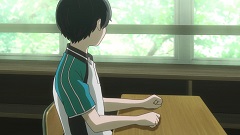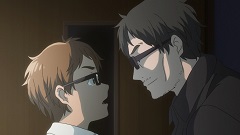Let’s have a round of applause for Maki the Genius, everyone. In a tennis club full of clashing personalities, only he was incisive enough to see that hotheads and shy boys shouldn’t be paired together. Imagine everyone’s surprise when he put compatible players on the same doubles teams and they immediately started to work in synchronicity. He even took it easy on them to boost their confidence, a gesture that the script bends over backwards to illustrate. And just in case you missed his masterful makeover of the tennis team, Toma directly thanks him for bringing about all this change in such a short amount of time. How does Maki respond? “Naw, everyone is just trying their best.” Sasuga Maki-sama. Is there anything this kid can’t do? Apart from stopping his new best friend from signing his own death warrant, I mean.
You may have gathered from the above paragraph that I wasn’t wild about these episodes. Truthfully, I expected grade A character drama from Hoshiai no Sora, but instead I received a conveniently-paced sports anime with some parental trauma spliced in once or twice per week. It feels like Akane-san worked backwards when designing this series; he started with a set of difficult family relationships for perhaps a dozen kids, then filled in the massive gaps with tennis training and general middle school life. As a result, plot points like Rintaro’s struggle with the knowledge that he’s adopted come and go without leaving a mark. He feels like he’s not fulfilling his role as the club’s vice president, but Toma already sang that song several weeks ago. And can anyone explain the purpose of Kinuyo AKA Ruriha AKA Kaori’s digression in the most recent episode? Her rich family members are domineering, forcing her to attend the school of their choice and calling her by names she doesn’t prefer. That’s a sad situation, but what does it have to do with tennis, or any of the main characters? I understand that she controls their club’s funding, but what’s the connection between that fact and her identity issues?
Some might say that it’s too early to worry about how these smaller stories fit into the big picture. Others could contend that they don’t need to fit at all. But I’d argue that the show’s creation of an entire middle school ecosystem, clearly displayed in the first two episodes, demonstrated an intent to connect those difficulties as a shared generational experience. More recent installments have strayed from that thesis, often by smoothing things over with progress on the tennis court. Thankfully, Maki’s dad troubles are still front and center, but even there, we have ridiculous developments like Toma lying in wait for a known abuser, planning to send him packing with the power of cold, hard cash. When that doesn’t work, he threatens to kill him, then willingly supplies his real name when asked. Hello?! I’m sure emotions were running high, but come up with something else, my man! Use the name of a character from TV or something. The badly-conceived nature of Toma’s plan actually makes Maki’s father less menacing, now that his subplot has to resolve this death threat situation.
Hoshiai no Sora is trying to do so much. There are references to a five year old incident at Shijo Middle’s tennis club, perhaps a result of a “win at all costs” mentality that advisor Sakurai has tried to shed since then. There’s a boisterous redheaded rival from Misaki Academy who promises to punch the losers in an upcoming practice match. We’ve got to check in with Yuta, the sensitive manager who’s quickly found acceptance within the club thanks to his careful preparation. The show’s dual money problems (for both the tennis club and Maki himself) are constantly lurking in the background. One of the remaining minor characters will likely need some time for another sad backstory next week. Most of these are worthy ideas, but not necessarily worthy inclusions – not while the series feels as fragmented as it does at present, anyway. We’ll see whether episode 6 can hold together a bit more tightly. Either way, it ought to be a more positive review next time, as one episode per post makes writing these things a hell of a lot easier.




